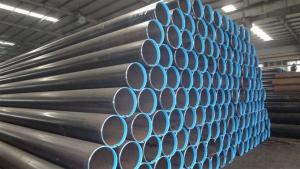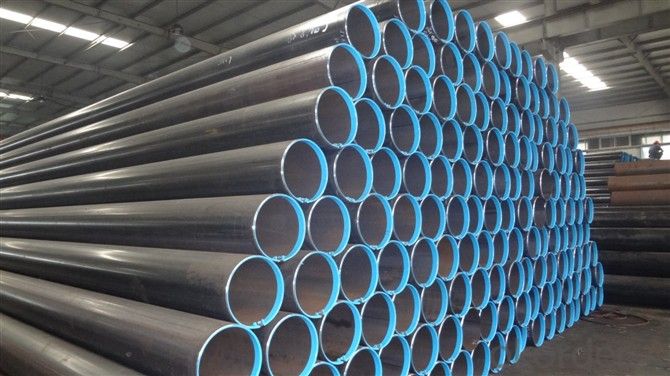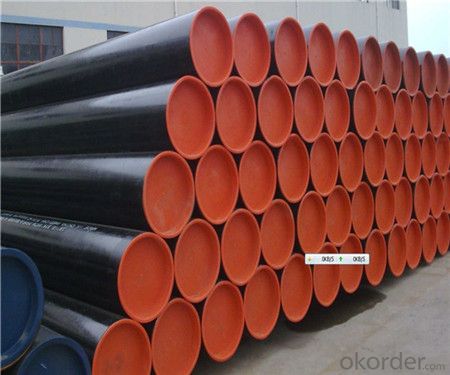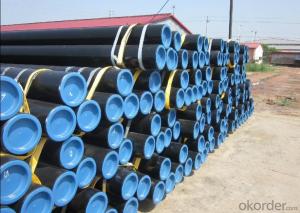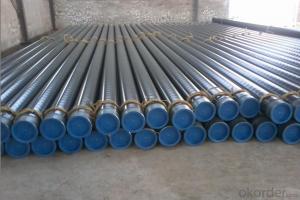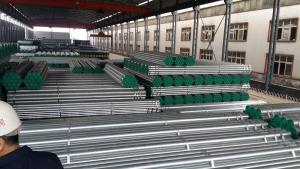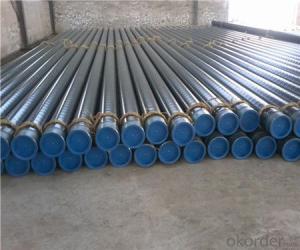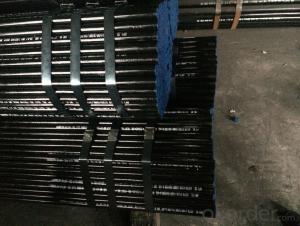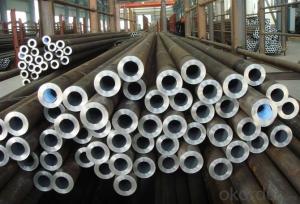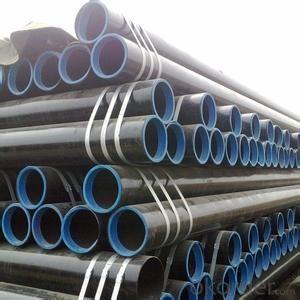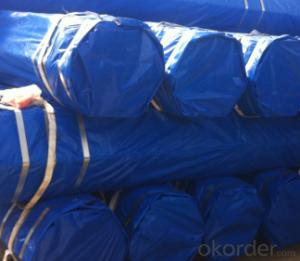API 5L/ASTM A53 ERW Steel Pipe with Best Quality
- Loading Port:
- Tianjin
- Payment Terms:
- TT or LC
- Min Order Qty:
- 20 m.t.
- Supply Capability:
- 15000 m.t./month
OKorder Service Pledge
OKorder Financial Service
You Might Also Like
1、Structure of API 5L/ASTM A53 ERW Steel Pipe with Best Quality:
ERW steel pipe is electric resistance welding, the abbreviation for ERW for transporting oil and natural gas vapor liquid objects, can meet the requirements of high and low pressure, the transport in the world with pipe sector accounted for a pivotal position.
2、Main Features of API 5L/ASTM A53 ERW Steel Pipe with Best Quality:
• High manufacturing accuracy
• High strength
• Good visual effect
• Reasonable price
• Small inertia resistance
• Strong heat dissipation ability
3、API 5L/ASTM A53 ERW Steel Pipe with Best Quality Specification:
Standard | GB, DIN, ASTM ASTM A106-2006, ASTM A53-2007 |
Grade | 10#-45#, 16Mn 10#, 20#, 45#, 16Mn |
Thickness | 1 - 33 mm |
Section Shape | Round |
Outer Diameter | 21 - 610mm |
Place of Origin | Tianjin, China (Mainland) |
Secondary Or Not | Non-secondary |
Application | Hydraulic Pipe |
Technique | Cold Drawn |
Certification | API |
Surface Treatment | factory state or painted black |
Special Pipe | API Pipe |
Alloy Or Not | Non-alloy |
Length | 5-12M |
Outer Diameter | 21.3-610mm |
Grade | 20#, 45#, Q345, API J55, API K55, API L80, API N80, API P110, A53B |
Standard | ASME, ASTM |
1) Material:20#(ASTM A 106/A53 GRB.API5LGRB,GB),45#,16Mn,10#.
2) Specification range:OD:21.3-610mm,WT:6-70mm,length:6-12m or according to the requirement of clients.
3) Excutive standards:GB,ASME API5L.ASTM A 106/A53,Despite of the above standards,we can also supply seamless steel pipe with standard of DIN,JIS,and so on,and also develop new products according to the requirements of our clients!
4) Surface:black lacquered,varnish coating or galvanized.
5) Ends:Beveled or square cut,plastic capped,painted.
6) Packing:bundles wrapped with strong steel strip,seaworthy packing.
4、Packaging & Delivery
Packaging Details: | seaworthy package,bundles wrapped with strong steel strip |
Delivery Detail: | 15-30days after received 30%TT |
5、FAQ of API 5L/ASTM A53 ERW Steel Pipe with Best Quality:
①How is the quality of your products?
Our products are manufactured strictly according to national and internaional standard, and we take a test
on every pipe before delivered out. If you want see our quality certifications and all kinds of testing report, please just ask us for it.
Guaranteed: If products’ quality don’t accord to discription as we give or the promise before you place order, we promise 100% refund.
②How about price?
Yes, we are factory and be able to give you lowest price below market one, and we have a policy that “ for saving time and absolutely honest business attitude, we quote as lowest as possible for any customer, and discount can be given according to quantity”,if you like bargain and factory price is not low enough as you think, just don’t waste your time.Please trust the quotation we would give you, it is professional one.
③Why should you chose us?
Chose happens because of quality, then price, We can give you both.Additionally, we can also offer professional products inquiry, products knowledge train(for agents), smooth goods delivery, exellent customer solution proposals.Our service formula: good quality+good price+good service=customer’s trust
SGS test is available, customer inspection before shipping is welcome, third party inspection is no problem.
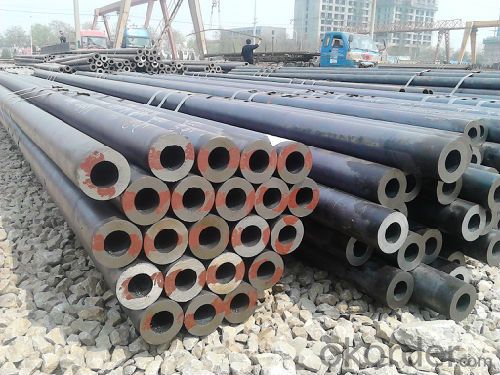
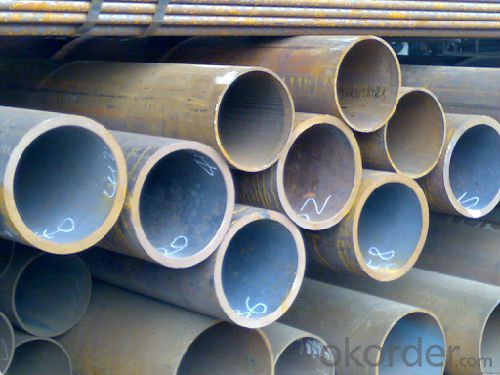
- Q: What are the advantages of using pre-fabricated steel pipes?
- There are several advantages of using pre-fabricated steel pipes. Firstly, they offer superior strength and durability, making them resistant to extreme weather conditions and corrosion, resulting in longer lifespan. Secondly, pre-fabricated steel pipes can be manufactured to precise specifications, ensuring easy installation and reducing construction time and costs. Additionally, they provide excellent structural integrity, which makes them ideal for carrying heavy loads and withstanding high pressure. Lastly, pre-fabricated steel pipes are eco-friendly as they are recyclable, contributing to sustainability and reducing environmental impact.
- Q: What is the role of steel pipes in power plants?
- Steel pipes play a crucial role in power plants as they are used for transporting various fluids, such as water, steam, and fuel, throughout the facility. They provide a durable and reliable means of conveying these substances under high pressure and temperature conditions, ensuring efficient energy generation and distribution. Additionally, steel pipes are essential for the cooling systems in power plants, allowing for the safe transfer of heat from the facility to the environment.
- Q: What is the difference between steel pipe and ductile iron pipe?
- Steel pipe and ductile iron pipe are both commonly used in various industries for transporting fluids and gases. However, there are some key differences between the two materials. One of the main differences is their composition. Steel pipe is made primarily of iron and carbon, with other alloying elements added to enhance its strength and corrosion resistance. On the other hand, ductile iron pipe is a form of cast iron that has been treated to improve its ductility and toughness. It contains higher amounts of carbon and silicon, along with small amounts of other elements such as magnesium and copper. Another difference is their strength and durability. Steel pipe is known for its high strength and can withstand higher pressures and stresses compared to ductile iron pipe. It is also more resistant to impact and bending, making it suitable for applications where high strength is required. Ductile iron pipe, although not as strong as steel, still offers good strength and durability, especially in applications where there is a risk of external damage or heavy loads. Corrosion resistance is another factor to consider. Steel pipe is typically more resistant to corrosion due to the addition of alloying elements such as chromium and nickel. This makes it suitable for applications where there is a high risk of corrosion, such as pipelines carrying corrosive fluids. Ductile iron pipe, while also having some corrosion resistance, may require additional protective coatings to enhance its durability in corrosive environments. Installation and maintenance are also different for these two types of pipes. Steel pipe is generally lighter and easier to handle, making it easier to install. It can also be welded, which allows for more flexibility in the construction process. Ductile iron pipe, being a cast iron material, requires more specialized installation techniques, such as using mechanical joints or flanges. It is also more prone to cracking during installation if not handled properly. In terms of cost, steel pipe is generally more expensive than ductile iron pipe. This is due to the higher cost of raw materials and the additional processing required to produce steel pipe. However, it is important to consider the overall lifecycle cost, as steel pipe's higher strength and corrosion resistance may result in lower maintenance and replacement costs in the long run. In summary, while both steel pipe and ductile iron pipe have their own advantages and applications, the choice between the two depends on factors such as strength requirements, corrosion resistance, installation methods, and budget considerations. Careful consideration of these factors will help determine which pipe material is most suitable for a specific application.
- Q: Can steel pipes be used for transporting slurry?
- Steel pipes can indeed be utilized for the transportation of slurry. They find widespread application in several industries, such as mining, construction, and oil and gas, where they serve the purpose of conveying various types of fluids, including slurry. Slurry, typically comprising solid particles suspended in a liquid, primarily water, poses no challenge for steel pipes, as they possess the necessary robustness and endurance to handle its abrasive characteristics. Moreover, steel pipes exhibit exceptional resistance against corrosion, a crucial factor when confronted with slurry that may contain corrosive elements. Furthermore, the sleek interior surface of steel pipes plays a significant role in minimizing friction and ensuring the smooth and efficient flow of the slurry. In conclusion, steel pipes stand as a dependable and widely preferred option for the transportation of slurry due to their strength, durability, resistance to corrosion, and smooth inner surface.
- Q: Can steel pipes be used for natural gas processing plants?
- Yes, steel pipes can be used for natural gas processing plants. Steel pipes are commonly used in the oil and gas industry due to their high strength, durability, and resistance to corrosion. They can safely transport natural gas and are capable of withstanding the high pressure and temperature conditions typically found in processing plants.
- Q: How do steel pipes handle high-velocity flow?
- Steel pipes are able to handle high-velocity flow due to their strong and durable nature. The smooth inner surface of steel pipes allows for efficient and smooth flow of fluids, minimizing frictional losses. Additionally, steel pipes have high tensile strength, enabling them to withstand the pressure exerted by high-velocity flow without deformation or bursting.
- Q: What are the different wall thicknesses available for steel pipes?
- Steel pipes are available in various wall thicknesses to meet specific requirements and applications. Different schedules indicate the wall thickness. The most commonly used wall thicknesses for steel pipes are Schedule 40, Schedule 80, and Schedule 160. Schedule 40 pipes have a medium wall thickness and are commonly used for general-purpose applications, like conveying fluids and gases. They are suitable for low-pressure systems and widely used in plumbing, HVAC, and irrigation systems. Schedule 80 pipes have a thicker wall compared to Schedule 40 and are designed for high-pressure applications. They are commonly used in industrial settings, oil and gas pipelines, and high-pressure fluid transport systems. The increased wall thickness ensures higher strength and durability to withstand pressure. Schedule 160 pipes have the thickest wall among the available options. They are designed for extremely high-pressure applications, such as refineries, chemical plants, and power generation facilities. These pipes offer exceptional strength and can handle intense pressure and stress in industrial environments. In addition to standard schedules, there are other wall thicknesses available for specific purposes. For instance, extra-strong (XS) pipes have a thicker wall than Schedule 80 pipes and are used for applications requiring even higher pressure resistance. It is crucial to consult professionals or refer to industry standards to determine the appropriate wall thickness for a specific application. Factors like fluid or gas pressure, temperature, and environmental conditions should be considered when selecting the suitable steel pipe with the desired wall thickness.
- Q: How are steel pipes used in the manufacturing of furniture?
- Steel pipes are commonly used in the manufacturing of furniture to provide structural support, such as in the construction of chair and table frames. They are also used as a base for attaching other materials, such as wood or fabric, and can be bent, shaped, and welded to create various designs and styles.
- Q: How are steel pipes used in the manufacturing of fire sprinkler systems?
- Steel pipes are commonly used in the manufacturing of fire sprinkler systems due to their durability and resistance to high temperatures. These pipes are used to transport water or other fire suppressants from the water supply to the sprinkler heads. The steel pipes are able to withstand the pressure and heat generated during a fire, ensuring a reliable and effective fire suppression system.
- Q: What is the lifespan of galvanized steel pipes?
- The lifespan of galvanized steel pipes can vary depending on several factors such as the quality of the galvanizing process, the environment in which they are installed, and how well they are maintained. However, on average, galvanized steel pipes can last between 40 to 70 years before they may start to show signs of corrosion or degradation.
Send your message to us
API 5L/ASTM A53 ERW Steel Pipe with Best Quality
- Loading Port:
- Tianjin
- Payment Terms:
- TT or LC
- Min Order Qty:
- 20 m.t.
- Supply Capability:
- 15000 m.t./month
OKorder Service Pledge
OKorder Financial Service
Similar products
Hot products
Hot Searches
Related keywords
